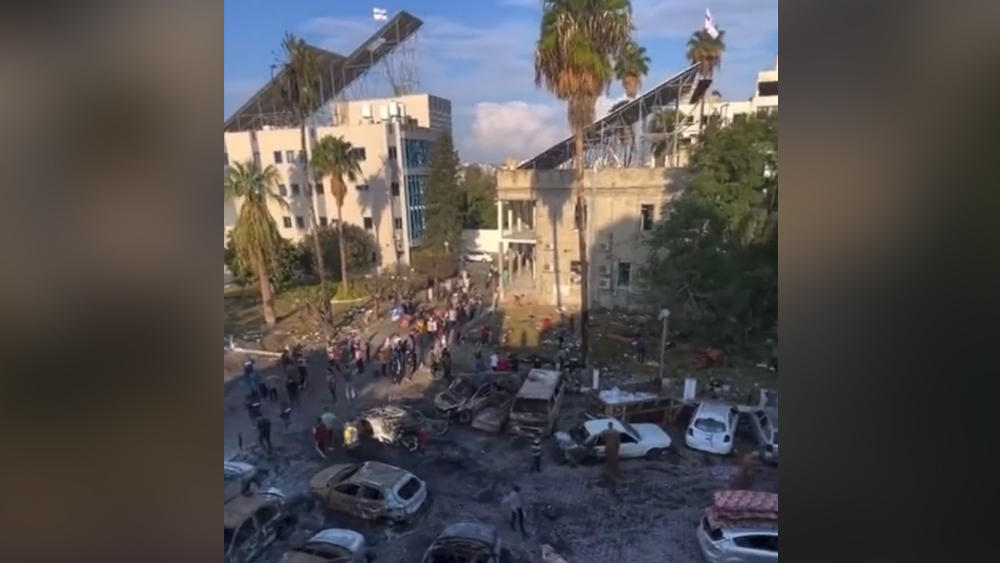Jordan threatens WAR with Israel if Palestinians are expelled into its territory
By ramontomeydw // 2025-02-08
Tweet
Share
Copy

- The Hashemite Kingdom of Jordan has issued a stern warning to Israel, stating that any attempt to forcibly expel Palestinians into Jordan would be considered an act of war.
- Jordan's position is influenced by its 1994 peace treaty with Israel and the historical precedent set during the 1967 Six-Day War. The kingdom is particularly concerned about the violation of this treaty.
- Jordan, already burdened with millions of Palestinian refugees, is wary of the economic and demographic consequences of accepting more refugees, which could destabilize the country.
- U.S. President Donald Trump's proposal to have Jordan and Egypt absorb Palestinians from Gaza has been met with strong opposition from Amman, other Arab states and critics in the U.S. who view it as a form of ethnic cleansing.
- The situation has raised fears of another regional conflict, with Jordan's warning echoing the tensions that led to the 1967 Six-Day War.
The Six-Day War legacy: Amman's warning and the threat of regional conflict
This is not the first time Amman and Tel Aviv crossed swords. The 1967 Six-Day War saw Israel defeat a coalition of Arab forces – including Jordan, Egypt and Syria – in a matter of days. As a result of this conflict, Israel occupied the West Bank, Gaza Strip, Sinai Peninsula and Golan Heights. While this conflict from almost 60 years ago reshaped the geopolitical landscape of the Middle East, Amman's current warning evokes memories of that war and raises fears of another regional conflagration. Trump appears undeterred despite the backlash. Speaking alongside Israeli Prime Minister Benjamin Netanyahu on Tuesday, Feb. 4, he suggested that "really rich" nations could provide land for Palestinians to build new lives. These new tracts of land for the Palestinian people would be so attractive that they would not want to return to their homeland, Trump added. Netanyahu praised Trump's "higher level" thinking, calling it a potential game-changer for the region. But Georgetown University scholar Khaled Elgindy pointed out that Trump's ideas reflect a real estate developer's mindset rather than a nuanced understanding of the region's complexities. "He clearly did not talk to any Palestinians in coming up with these ideas," Elgindy said. The situation is further complicated by Trump’s decision to cut U.S. aid to Jordan, raising fears that he may condition its restoration on Amman's acceptance of Palestinian refugees. Such a move would exacerbate the kingdom's economic challenges and risk reigniting internal strife. The country, already home to millions of Palestinian refugees, fears a repeat of the 1970 Black September conflict – in which tensions between the Hashemite monarchy and Palestinian factions erupted into violence. As the crisis deepens, the specter of war looms large. Jordan's warning is a reminder that the forced displacement of Palestinians is not just a humanitarian issue but a potential flashpoint for broader conflict. The echoes of 1967 serve as a sobering reminder of the consequences of miscalculation in a region where history has a way of repeating itself. Watch Jordanian Foreign Minister Ayman Safadi arguing that Israel "has the occupying power" in this clip. This video is from the alltheworldsastage channel on Brighteon.com.More related stories:
The Palestinians were right all along: Netanyahu wants them completely expelled from the region. Israel rewards Jordan with year-long extension of WATER AGREEMENT for helping shoot down Iranian drones. Netanyahu says Israel will maintain "indefinite security control" over Gaza – Palestinians will forever be held as POWs in a concentration camp. Sources include: MiddleEastEye.net MSN.com Britannica.com Brighteon.comTweet
Share
Copy
Tagged Under:
collapse Donald Trump national security Israel violence genocide Middle East human rights depopulation chaos Palestine humanitarian fallout displacement outrage depot Jordan Gaza Strip Israel-Palestine war Holy War Palestinian refugees Six-Day War King Abdullah II Israel collapse
You Might Also Like
Netanyahu vows to “open the gates of hell” if Hamas fails to release all hostages
By Cassie B. // Share
Trump administration gives schools 14 days to scrap DEI policies or lose federal funding
By Cassie B. // Share
WHO pushes defective vaccines on Gazans, ignoring critical needs in the region
By Lance D Johnson // Share
Recent News
Millions without power as Spain and Portugal face unprecedented power outage
By isabelle // Share
China bets on Huawei’s Ascend chips to replace banned Nvidia technology
By isabelle // Share
Natural Nootropics vs. Big Pharma: How green tea’s L-theanine outshines dangerous ‘limitless’ drugs
By finnheartley // Share
Breaking through the nut barrier: Hope for adults with peanut allergies
By willowt // Share











